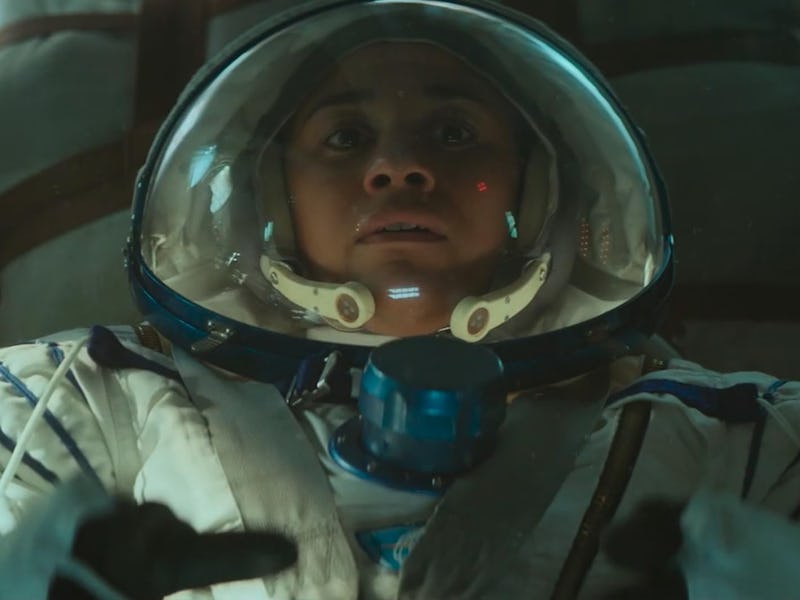I.S.S. Is the Kind of Perfectly Solid Space Thriller We Need More Of
In space, no one can hear you say, “That was pretty good.”

I envy the astronauts who escape our atmosphere and gaze back at our planet with clear eyes. The overview effect, as it is called, is a known phenomenon when you glimpse Earth from way out in space and see its magnificent surface scrubbed of arbitrary national borders. The ugliness on the ground — the hatred and the bloodshed and the disasters and the warming climates, instigated by greed and myopia — all appear to vanish by their diminutive size. Wars seem small when seen from above. Those who’ve felt it have likened it to a spiritual rebirth, with newfound faith in the universal brotherhood of man. Former NASA astronaut Mike Massimino told Inverse in 2018 that the experience is to see “what heaven must look like.”
In director Gabriela Cowperthwaite’s third narrative feature, I.S.S., astronaut and scientist Dr. Kira Foster (Arian DeBose) reacts to this potentially life-changing experience with a shrug. Practically invited to witness heaven, she acts as if you’ve made her look at a 7-Eleven instead. It’s in this moment that Cowperthwaite makes clear her movie’s pronounced cynicism of humankind, whose default settings include suspicion, deception, and violence. In this taut, remarkable nail-biter — which suffers from an unceremonious Dry January release — American and Russian astronauts aboard the International Space Station (ISS) draw lines against each other when a ground war breaks out and recolors our green and blue planet with swaths of nuclear orange.
Galvanic and compact, I.S.S. is a middleweight thriller whose pressure-cooker plot heats up to a satisfying boil. While it isn’t very enlightening in its jaded portrayal of the human condition, it’s always running at such a propulsive pace that its claustrophobia never once feels suffocating. By the end of it all, I.S.S. stays in your head as an even-keeled darling of mid-budget escapism with an unquestionable, albeit bleak parting message: Man can and will revert to feral survival instincts even when they stand on the bleeding edge of civilization’s achievements.
In I.S.S., the aforementioned Dr. Kira Foster is one of six scientists — and one of the only six characters in the movie. It opens with her arrival, alongside Christian (John Gallagher Jr.), to the ISS to join fellow American astronaut Gordon (Chris Messina). The Russian crew — played by Pilou Asbæk, Costa Ronin, and Maria Mashkova — welcome them with open arms. Despite a minor language barrier, the ISS is the chillest house party this side of the Milky Way. Over shared meals and drunken karaoke, the six strive to keep civility among themselves despite a (nondescript and vague) conflict back home. Serenity is threatened amid sudden war between the United States and Russia, with the ISS being the first neutral territory — and both superpowers demand their respective people on board claim it.
While I.S.S. plays off the vapors of Cold War tensions with all the nuance of something between a Tom Clancy novel and a Call of Duty sequel, nothing about those meaningless particulars get in the way of what I.S.S. is ultimately trying to be: an elaborate chess game of mistrust played in a most delicate place. It’s a relief, then, how much I.S.S. plays to its specific strengths, never overreaching to be more than what its sealed environment can contain. It’s basically a grown-up, unofficial live-action imagining of Among Us, and I mean that as a compliment.
Cowperthwaite, who is best known for documentaries like the consequential 2013 hit Blackfish, similarly plays to her own strengths here. While sympathetic characters occupy the forefront of her frames, they often stand on her activist intentions to improve the world somehow. Her movies like Blackfish, The Grab, and her polarizing FX docuseries Children of the Underground all seek a practical way to fix humanity in spite of overwhelming self-serving interests. This urgent energy is abstract but nevertheless felt here, a film that heavily implies the shameful tolls of territorial control. One can argue peace could have been sustained if neither side heard — or ignored outright — their unseen masters on the ground. It might have made for a more interesting movie, too. But Cowperthwaite’s choices and her executions of them are serviceable in the name of entertainment. When two people kill each other in a surprisingly vicious knife fight, their lifeless, floating bodies rest in an embrace. Cowperthwaite captures it all with appropriate dignity.
The cast of I.S.S. is small but talented.
Between rock-solid performances (Mashkova is a standout, the distress in her voice alarming to the senses) and enough suspense to make the heart pump to burn calories, I.S.S. is more than its minuscule scope implies. It’s not too ambitious. It’s simply a gem of structurally sound mainstream filmmaking, the sort of which is missing in our cineplexes and our streaming queues.
While it’s easy to roll eyes at these ostensibly smart humans behaving like dimwits as they easily succumb to hysteria, a quick scroll of all your social feeds should remind you how moronic we can be. Why our instinct is to draw weapons rather than extend our hands. The draw of the overview effect is that for as hopeless we may feel about our species, we’d welcome a reminder that we can be so much more. The defeated, traumatized faces that close out I.S.S. suggest otherwise. We are still too close to cavemen than we are to vanguards.